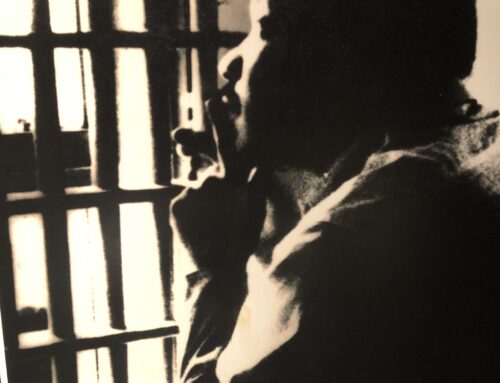
Even wise-guy Solomon didn’t understand everything:
Three things are too wondrous for me; four I can’t understand: the way of an eagle in the sky, the way of a snake on a rock, the way of a ship at sea, and the way of a man with a young woman.” –Proverbs 30:18-19
His lack of understanding in this case was an expression of wonder—awe of God’s created order. We’ve been granted incredible scientific insight that Solomon did not have, but these simple things are still too wonderful to fully grasp.
And then there are other things, much less wonderful but no less common things that I find difficult to understand. These things still surprise me. When I hear them, I often think, “Oh no. Not you. Not this. How could this be possible?”
Inspired by Solomon, I could write,
“Three things are too difficult for me; four I cannot understand: that a child dies in her mother’s arms, the infertility of two righteous lovers, the unsolvable diagnosis of the young, and the perennial brokenness of the perfect family.”
These are the things that stop me and cause me to ask God questions that never earn his reply.
When my pastoral responsibilities lead me into the home of a sufferer, I’m grateful for God’s grace, but still mystified by the pain he allows. Perhaps some people get past it, but I’ve found age and experience only deepen my grief for my neighbors.
Jesus sweat drops of blood begging the cup of suffering to pass by. The burden of the world’s sin sickness weighed him down. Maybe at least some of the pain Jesus felt in the garden came from the realities of these four ordinary tragedies.
The death of a child
It was a weekday, but First Baptist Church was full. The pastor opened the back door, the congregation stood in honor as he led the family to the front of the sanctuary where the casket of their son was waiting. I was a senior in high school, and on the previous Sunday afternoon, December 4, 1988, my classmate Jason Few drove his Ford pickup across the railroad track into the path of the train that ran right through city center.
Jason was an only child, and watching his precious mother and father grieve him was formidable for me. Unfortunately, it wasn’t the last time I would watch parents grieve the death of their child. Actually, it’s become a surprisingly common experience.
We say that it’s just not the natural order for parents to bury their children, and that is true. But from the very beginning, sin disrupted the natural order of God’s creation. The first parents, Adam and Eve, experienced this pain first hand as they lost Abel to the hands of Cain, and then Cain to the discipline of God.
At least Adam and Eve had a few good moments with their sons, you may say. Too many couples hold their baby without ever feeling his breath or hearing her coo. Who can understand this?
The infertility of lovers
God said to be fruitful and multiply. Most young married husbands and wives expect in the right time to bear children. Yet so many hopeful couples find themselves grieving the loss of a child they never had.
How could God deny these righteous lovers the opportunity of honoring Him by bearing children? Where is the justice in unstable or disinterested adults having kids when Christ-honoring, responsible couples are barren? Where is the wisdom of God in that? How do young married lovers make sense of it?
Anyone would understand them suffering the consequences of their own sin, but why should they bear the consequences of sin’s curse on humanity in such a personal way? Isn’t there a fix for this? Surely prayer and advanced medical care will see them through to success. But what happens when every resource available falls short? Who can understand it?
The disease of the young
It could have been pancreatic cancer that took his life, but we really don’t know. My grandfather was 88 years old. Many organs were under stress, and his body wore out. Unless the Lord Jesus returns, none of us will get out alive.
But several times weekly I hear of another friend or family member in the prime of life diagnosed with some form of cancer. I walk into the children’s hospital that feels more like Disney World than a hospital reminded how many kids must be battling for their lives to provide a facility like this. The call from a church member often begins, “My wife found a lump. The biopsy came back. We have a treatment plan. We just wanted you to know.”
I end the call or walk back to the hospital parking garage thankful to stand and pray with these friends during these sacred moments of sickness. But it’s also not uncommon for me to sit in my car with my head on the steering wheel crying out to God for healing mercy.
Why are the bodies of the young so vulnerable to disease? They should be swinging in the park, baking a birthday cake for their husband, or watching the grandkids while their kids are at the concert downtown. But instead, they spend a day a week hooked up to a chemo drip and the next seven days too tired to know what day it is.
Where is the abundant life in that? Who can understand it?
The dysfunction of the family
She was a beautiful blond lady and he was a handsome gentlemen. She was energetic and he was hilarious. I was only a few years into ministry, but this couple seemed so together. They had the look, the personality, and the money every white-picket fence family could dream of.
Then one night, I got a phone call. He was traumatized. Through sound of tears, he asked me to come over. I got myself together, put on my Superman outfit, and drove to the house. She was gone. He was alone. Things would never be the same.
That wasn’t the first or the last “perfectly normal” couple to be outed by sin. Even husbands and wives who love Jesus can struggle to love one another. Even the families that have been given every opportunity to win and have so much to lose often choose to live with systemic, low-grade dysfunction.
Sometimes that dysfunction can grow to unmanageable levels so that the family shatters, but often it doesn’t. Instead, it simply undermines love, steals joy, hardens the heart of the children, and sidelines sincere Christians from the life Jesus redeemed them to live. Who can understand it?
What do we do with this kind of suffering?
We may tend to despair because there’s more. There’s the teenage daughter rejected by her unbelieving father for trusting Jesus. There’s the drought stricken region of an impoverished country that leaves nothing for the faithful farmer and his family. There’s the mother silently battling chronic depression while attempting to function in middle-class suburbia.
Despair feels so natural, so justified; yet it only adds to the suffering and becomes a tragedy of its own.
So instead of despairing, let us run to the pain. We make no attempt to deny it or even to explain it. It is real, but as unexpected as it is for us, this is the pain of Gethsemane. This is exactly the suffering Jesus came to bear on the Cross in our place and on our behalf.
Not all pain is the result of our specific sin, but all pain is the result of sin: ours, someone else’s, or the curse of sin on creation. No matter its source, Jesus grieved it, bore the weight of it, and defeated it for us.
So while suffering wounds us, it does not destroy us.
The apostle Paul said it like this,
Now we have this treasure in clay jars, so that this extraordinary power may be from God and not from us. 8 We are afflicted in every way but not crushed; we are perplexed but not in despair; 9 we are persecuted but not abandoned; we are struck down but not destroyed. 10 We always carry the death of Jesus in our body, so that the life of Jesus may also be displayed in our body. 2 Corinthians 4:7-10
Life in Christ is a crucified life with all the hardships that go with it, but it is also a resurrected life with all the victory that goes with it. Sin may have its day, but we have a future that is secure and free from sin’s curse.
So we do not give up. We do not turn back. We do not despair. Instead, we trust God. We look to Jesus, we hold our loved ones close, and we wait with confidence for the glory to be revealed.




